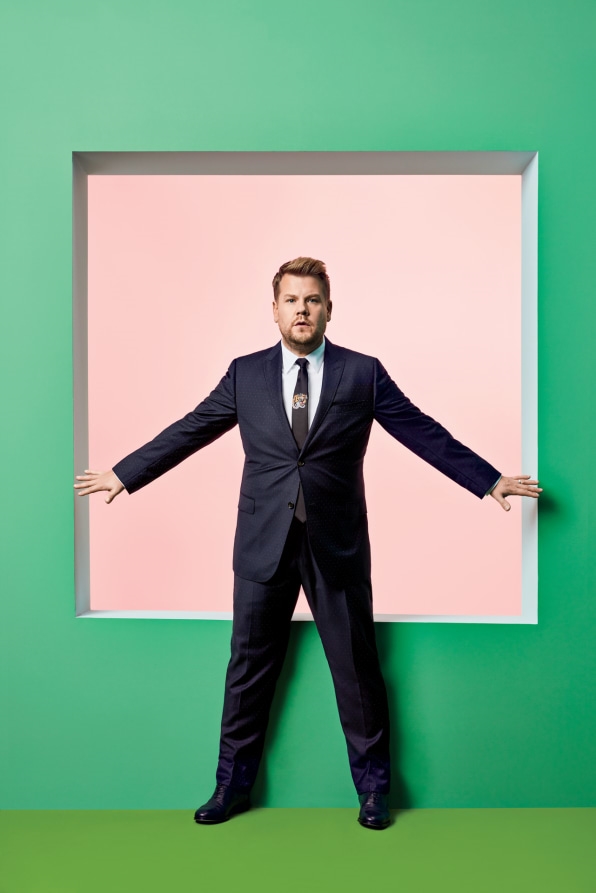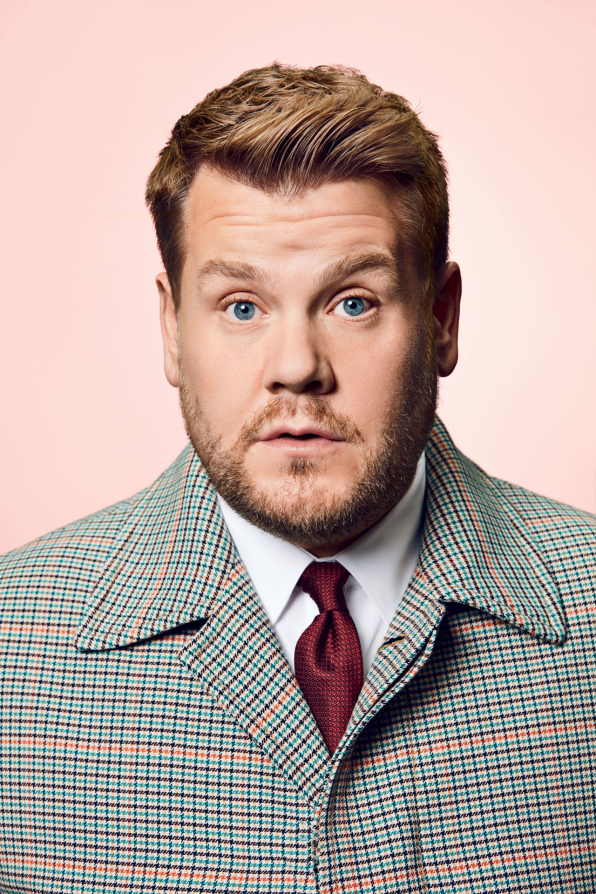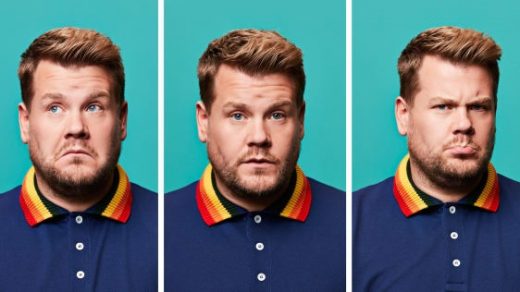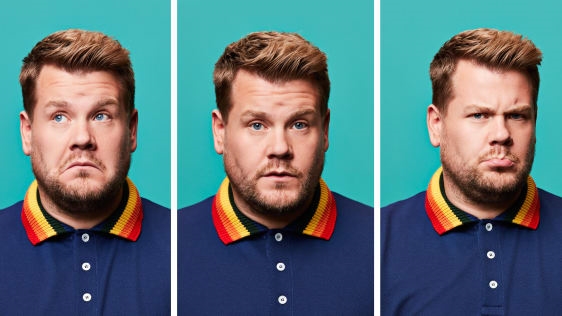James Corden Lives In The Moment. Here’s How.
James Corden’s office, at CBS Television City in Los Angeles, is crammed full of showbiz clutter—dog-eared scripts, award-show trophies, a framed thank-you note from a former first lady. But there’s one small item sitting atop a pile of magazines on a coffee table that Corden couldn’t get through the day without, a simple artifact that plays a key role in the Zen order of his work-life philosophy.
“I try to carve out six or seven minutes of silence twice a day, which is where this thing comes in handy,” he says, picking up a little black sleep mask, the kind airlines give away in first class. “Some people would call it meditating. But I don’t do breathing exercises. I don’t ‘go’ anywhere in particular. I just do this”—he slips on the mask for a few seconds and assumes a blissfully blank expression—”and then when I’m done, it’s like, restart!”
Wearing a cardigan and jeans and slouching on his office sofa on a cool September morning, the 39-year-old British stage actor turned talk-show host looks like he could sorely use a seven-minute nap. He was up past midnight last night—his preferred bedtime is 8:45 p.m.—in a Silver Lake studio recording a song for Peter Rabbit, Sony’s upcoming animated feature in which he voices the cotton-tailed garden dweller of British children’s literature. (“We all grew up reading the books in England,” he notes. “The character is sacred.”) He’s been shuttling to the Warner Bros. lot as well, for postproduction work on next summer’s Ocean’s 8, in which he’ll costar as an insurance investigator on the trail of thieves played by Cate Blanchett, Sandra Bullock, and Anne Hathaway. He’s gearing up to host the Grammys this winter for the second year in a row. (Corden is a celebrated master of ceremonies: The Tony Awards he hosted in 2016 won an Emmy.) Then there are his duties as a producer at Fulwell 73, the production company he runs with best friend and business partner Ben Winston. Fulwell rents offices right down the hall, where, among many other things, it’s creating serialized spin-offs of Corden’s late-night bits, such as “Carpool Karaoke” for Apple Music and “Drop the Mic” for TBS, plus a new reality show about pro soccer for YouTube, a platform where Corden has one of the fastest-growing channels, with 12 million subscribers and counting.
Related Video: How Bad Is James Corden At Firing People? See For Yourself.
Then there’s his day job: He’s the bloke behind the desk of CBS’s The Late Late Show, which shoots four afternoons a week on a soundstage next door to his office.
“Talk-show host could be the easiest job in the world, if you wanted it to be,” Corden says, rubbing his bleary eyes. “Monologue, desk bit, chat with a comedian, good night, and you’re done. But that’s not the sort of show I want to do. And what helps is doing all this other stuff. I know that if I didn’t seek out and do things outside of this show, I’d lose my creative mojo. And I don’t want that to happen. But it is exhausting. What I’ve come to realize is that you just have to try to be present wherever you are. You can’t think about tomorrow or next week or even this afternoon. You just have to be the best version of yourself right now. Now, keep in mind, I’m saying this as someone who gets it wrong 25 times a day. I’m just saying this is what I strive for. It’s the only way I know to have success.” He stretches back on the sofa and tries to stifle a yawn. “So don’t think I’m some kind of fucking Yoda.”
At a taping of The Late Late Show 18 hours earlier, Corden was more Energizer Bunny than Peter Rabbit, bopping into the greenroom to welcome musical guests Fifth Harmony and then jogging across the stage for a quick preshow wave to the studio audience. A lot of late-night hosts on network TV still follow in Johnny Carson’s cool, detached footsteps, smoothly gliding out from between the curtains and tugging at their neckties during snarky monologues. Corden’s show has a more goofy, manic rhythm. Guests are interviewed two or three at a time, rather than individually, and asked to perform a range of dignity-testing feats. Tonight, for instance, the members of Fifth Harmony will take turns playing a game called Flinch, in which they will stand behind a transparent plexiglass wall holding martinis as Corden shoots apples and oranges at their heads with a high-speed fruit cannon (if they spill, they lose).
It’s not merely the silliness that sets Corden apart from other late-night hosts—Jimmy Fallon has plenty of impish energy—but his relatability. Sitting in the studio audience during a taping is less like attending a show than being part of one, with Corden, the son of a Royal Air Force musician father and social-worker mother, slipping in and out of the crowd, dispensing high fives and mingling with his fans. Everything about The Late Late Show is engineered to break down barriers and unite performer and viewer, including the camera cranes that sweep above the studio to capture shots of the audience during the taping, sometimes on the Dance Cam or Kiss Cam (which are upbeat echoes of David Letterman’s once-vanguard Thrill Cam and Monkey Cam). “It feels like he’s doing the show just for you,” notes CBS president and CEO Leslie Moonves, “even though it’s going out to millions of people.”
The story of how Moonves “discovered” Corden and gave him the 12:30 a.m. slot previously held by Craig Ferguson—and Craig Kilborn and Tom Snyder before him—is already a Hollywood legend. Moonves had never heard Corden’s name before the winter of 2013, when he happened to catch him playing a beleaguered servant in a Broadway romp called One Man, Two Guvnors, a role that the Buckinghamshire-born Corden originated on the London stage and that ended up winning him a Tony. The CBS executive was so overwhelmed by the actor’s performance he went home and looked him up on IMDb.
For a guy he’d never heard of, Corden had a pretty extensive résumé. He started out with roles on British shows like Fat Friends and Teachers, but quickly branched into meatier parts in serious films (Mike Leigh’s 2002 drama All or Nothing) and gigs in a handful of stage productions (including 2004’s History Boys). He became best known for comedy, having cocreated and costarred in Gavin & Stacey, one of the most popular sitcoms in British TV history (more than 14 million people—about a quarter of the U.K.’s population—watched the 2010 finale). In 2011, he filmed a hugely popular guest spot for U.K. Comic Relief that involved him belting out “I’m Your Man” with George Michael as they drove around London. (It was the very first carpool karaoke, although it wasn’t called that yet.) Corden was also about to have his first major part in a big American blockbuster, costarring with Meryl Streep in 2014’s fractured fairy tale Into the Woods. “I knew I wanted to be in business with this guy,” Moonves says. “He could sing, he could dance, he could do comedy, he could act. The fact that most Americans had no idea who he was just made him more exciting to me.”

Whether Moonves pitched a talk show to Corden or Corden pitched it to Moonves is a little unclear, even to Corden and Moonves themselves. “It is a little confusing,” acknowledges Corden. “But it just sort of happened.” Both remember Corden coming to CBS headquarters in New York that April for a meeting with Moonves and the network’s head of entertainment at the time, Nina Tassler, to discuss his idea for a scripted dramedy about “a guy in New York figuring out what his life was going to be,” as Corden describes it. But David Letterman had just announced his retirement from CBS’s The Late Show and Stephen Colbert had been named his successor, and suddenly the conversation at the meeting swerved to late night. “At one point, James said, ‘You know, what I’ve always really wanted to do is a chat show,’?” recalls Moonves. Ferguson, as it happened, had recently quit as the host of The Late Late Show. Moonves and Tassler shot each other glances. “One way or another,” Moonves says, “we wanted this guy on our network.”
“I tried to talk him out of it,” says Corden’s producing partner, Ben Winston, 34, who, along with corunning Fulwell 73, is also executive producer of The Late Late Show. (The two have been pals since Teachers, where Winston started his career as a production assistant.) “I felt like it was a bad idea for him. James is a very creative person. He gets frustrated doing the same thing for too long, and I thought he’d get bored doing a talk show every night. And at that time, he was about to have this big American movie come out—things couldn’t have been going better. I didn’t understand why he’d want to give it all up.”
Corden, however, saw an opportunity. “I think it was Lorne Michaels who famously said that there was no job after talk-show host, but I’m not sure I agree,” he says. “I think that might have been the case back in the linear network world, but now the lines are so blurred. I remember the first time I came to L.A., driving around, having meetings. The feeling was if you want to do movies, you don’t do TV. But now, everyone’s looking for a TV show. And then it was, you can do TV, but you can’t do commercials. And now everyone is looking for their George Clooney Nespresso ad. There used to be TV actors and film actors and theater actors and commercial actors. Now, there are just actors.”
Meanwhile, Corden, who has two small children and a third on the way with his wife, Julia Carey, was looking for a creative outlet that could get him home in time for dinner with his family. Television—even a series as demanding as a late-night talk show—is a lot easier to schedule around than film. Even though Corden isn’t excessively hands-on with Fulwell 73—he’s more of an “ideas guy,” says Winston, who oversees its 30 full-time employees—he does like to stay involved.
Plus, Corden suspected that a talk show might actually be less boring to make than movies. “I love shooting films,” he says. “But it’s slow. The days go on forever. I mean, Brad Pitt’s day today might be getting out of a car and walking through a door. That’s his whole day. I wasn’t sure that’s what I wanted. I realized that what I really love is just being in a room creating stuff.”
During his two years as host of The Late Late Show, ratings haven’t always soared—the program averages 1.32 million viewers a night, behind Nightline‘s 1.46 million and Late Night With Seth Meyers‘s 1.36 million—but who cares? Certainly not Moonves. “I hardly ever look at the overnights anymore,” he insists. “These days, it’s all about the online numbers.”

[Photo: JUCO; Stylist: Michael Fisher at The Wall Group; grooming: Daniele Piersons at Exclusive Artists ]
Those have been spectacular, particularly for “Carpool Karaoke.” Clips of The Late Late Show‘s hugely popular running skit, in which Corden and various celebrities belt out tunes while sharing a ride, draw international audiences that eclipse Super Bowl halftime shows. His May 2015 segment with Justin Bieber (they sang “Boyfriend” together) has pulled in 124 million views, while his drive with Adele in January 2016 has attracted about 169 million. His July 2016 “Signed, Sealed, Delivered” duet with Michelle Obama, which has nabbed more than 58 million views, precipitated that nice thank-you note hanging on the wall in his office.
“When you’re trying to put together a show like this, you’re searching for the things that will define it,” Corden says. “With David Letterman, it’s ‘Top Ten Lists’; with Jay Leno, it’s ‘Jaywalking’; with Jimmy Kimmel, it’s ‘Mean Tweets.’ So Ben Winston and I were thinking, ‘We’re in L.A. All anyone talks about is the traffic. Remember that thing we did for Comic Relief with George Michael singing in a car? “Carpool Karaoke”!’ But we had no idea how popular it would be.”
The sketch’s colossal internet traffic gives Corden more than bragging rights—in the new alchemy of show business, it can be transmuted into gold. Advertising rates online are a fraction of what they are on TV, but Corden’s massive digital audience gives him enough clout to demand a fatter ad rate even on old-fashioned broadcast airwaves. Plus, there are vast amounts to be made from endorsements and brand integration. In Corden’s “Carpool” episode with Selena Gomez, in June 2016, the pair stopped at a McDonald’s drive-through for fries and a Coke. The segment drew more than 75 million views on YouTube, offering McDonald’s far more exposure than it would have gotten from simply running an ad, say, during last year’s Oscars. Meanwhile, the fast-food chain printed ads for The Late Late Show on every paper bag and soda cup for six weeks.
“We do clips, like when James went to work in an Old Navy store for a day,” Winston says, offering another instance of how brand integration works on The Late Late Show. “Heineken sponsors our [on-set] bar. I guess you could call it product placement, but it’s not just that there happens to be a product placed in the background. We’re quite clever with the way we work with our brand partners. We make sure that it feels subtle and organic and [doesn’t oversell to] our audience.”
Ironically, perhaps, Corden and CBS have had incredible success turning viral segments back into TV shows. Take “Carpool,” for example. Last year, when Apple Music started looking around for material for its big push into original content, it immediately went to Corden. Or maybe Corden went to Apple. As with so many of his deals, it’s not clear. “I honestly can’t remember who went to who,” says Eddy Cue, Apple’s senior vice president of internet software and services. “But we had worked with James before on some other things. He’d done a TV ad for Apple, and we’d done some [sponsorships] on his show. He did a ‘Carpool Karaoke’ with Tim Cook [for the opening of Apple’s 2016 World Wide Developers Conference]. So it felt like a perfect fit. After all, ‘Carpool’ is a show about music, and we’re Apple Music.”
Corden says that selling cable network TBS on a series version of “Drop the Mic,” another Late Late Show skit in which Corden and a celebrity guest rap insults at each other, couldn’t have been easier. “We went in and said, ‘Here are some “Drop the Mic” clips, and here are the numbers. Some 19 million people watched this clip. This clip was watched by 12 million. Eight million watched this one.’ And TBS went, ‘Done. No pilot. 20 episodes.’?”
“The internet is an instant focus group,” says Michael Bloom, senior vice president of unscripted series at TBS, who was at that meeting. “It wasn’t a hard call.”
A few days after pelting fruit at Fifth Harmony on his show, Corden attended the Emmy Awards and stepped into a very different sort of crossfire. This one wasn’t as funny. A backstage photo of Corden giving former White House Press Secretary (and special Emmy guest speaker) Sean Spicer a friendly peck on the cheek went viral, in the worst possible way. Some people on social media likened it to kissing Joseph Goebbels. Even worse, at least in pop-culture circles, some compared it to Jimmy Fallon’s ruffling of Donald Trump’s hair in September 2016.
Corden doesn’t shy away from politics. In his monologue on the Fifth Harmony show, he roasted Senator Ted Cruz for getting caught “liking” a porn clip on Twitter. He says that talk of President Trump disbanding Michelle Obama’s “Let Girls Learn” initiative—which she was promoting while doing “Carpool Karaoke”—is “horrific.” He is also active with charities including Save the Children and Comic Relief, among others. But he doesn’t seem to relish politics the way his CBS colleague Stephen Colbert does. Neither, usually, do his viewers. “You could feel a lot of the studio audience going, ‘Who’s Ted Cruz?’?” Corden says the morning after the taping. “That’s just our show. A lot of people came to see a big pop band. They don’t pay attention to politicians.”
Corden decided to address the scandal the next day on his show, with an apology during the monologue. “Anyone ever have that feeling when you get a little drunk and then wake up the next morning and think, ‘Oh God, who did I kiss last night?’ It’s a bit like that,” he semi-joked. “To be fair, everyone was kissing ass last night at the Emmys. I just happened to kiss the biggest one there.” It was quintessential Corden: honest, sharp, and amiable, erasing any sense of distance between entertainer and audience. Some viewers saw it that evening on CBS, others on YouTube the next morning. In any case, it quickly defused the tension.
The fact is, many of Corden’s fans don’t know Sean Spicer from Ginger Spice. Corden has always played to a bigger room, one that isn’t up at 12:30 a.m. on weeknights, or following Hollywood events on Twitter, or even necessarily living on this side of the Atlantic. “We love James Corden,” says a teenage girl from Austria who dragged her parents to a taping of The Late Late Show during a family vacation in Los Angeles. “We watch him all the time. You know, on the internet.”
Time he wakes up: Between 6 and 6:30 a.m.
First thing he does: “Tell my son to go back to bed.”
Mantra: “If you’re doing it wrong, do it strong.”
Commuting habit: “Because of the time difference [between L.A. and England], either call my parents or my sisters or friends at home. I’ll pretty much chat on the whole way in.”
Nightly routine: “At the moment, watch Ozark, but I just finished it last night. I don’t know what I’m going to do from this point out.”
Time he goes to bed: “I try to be asleep by 10. I’m at my absolute happiest if I’m in bed by a quarter to 9.”
Fast Company , Read Full Story
(40)



